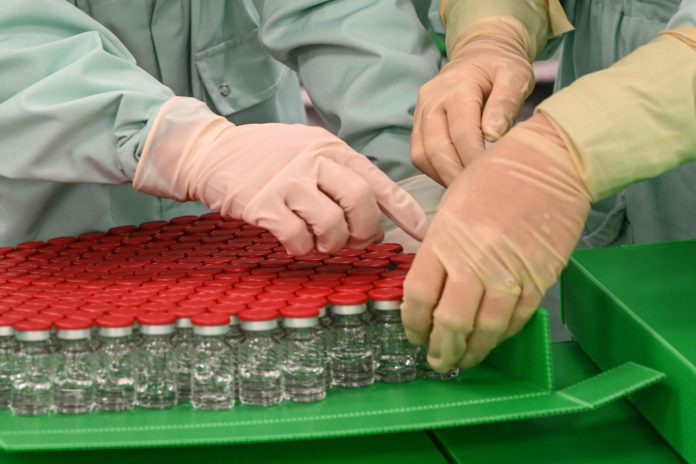IT IS imperative that the State can administer the Pfizer Covid-19 vaccine efficiently on a tight schedule – or Ireland risks losing its place in the queue, according to experts.
The news this week of the vaccine’s 90% effectiveness in clinical trials has given the world cause for hope that the end of the coronavirus pandemic may be in sight.
But one logistics expert, centrally involved in organising the airlifting of the vaccine around the world, has warned that vaccines will only be sent to countries that can guarantee delivery to the population with adequate supplies of syringes, dry ice and suitable cold storage and transport facilities.
Considerable questions remain about the State’s ability to deliver the vaccine outside of the existing public health/GP system given the necessity for it to be stored and transported at temperatures approaching -80C.
The way the Pfizer-BioNTech vaccine is due to be transported – and the freezing requirements – will mean the HSE will be operating in a very tight window of time to deliver the thousands of defrosted doses of vaccine to the populace before they become useless.
As the global head of cargo at the Geneva-based International Aviation Transport Association (IATA), Glyn Hughes has been dealing with the issue of national infrastructure put in place by governments to receive the vaccine.
In the early stages of the rollout, limited supplies destined for frontline workers will need to be carefully dispatched to those countries with appropriate infrastructure.
‘It starts with a government’s ability to disperse X number of doses, because the worst thing is to have more doses transported to a country than you can actually use. Those are all the questions that come into play way before you then say, I will need X million doses of vaccine per week, per day, per fortnight coming into one, two, three airports in any given country,’ said Mr Hughes.
‘You need to protect the integrity of the vaccine. Every dose of the vaccine can potentially save a life, so you don’t want to have any spoilage or any loss.’ Health authorities here have been consistently warned about the need to be ready to receive the vaccine. In a report on October 9, the World Health Organization’s European Regional Office detailed the strategic considerations EU countries should consider to prepare for a vaccine rollout.
‘The safe delivery of vaccines will require adequate vaccine management and supply chain logistics based on the final product profile of available vaccines (presentations and formulations, stability and temperature characteristics, storage and transport volumes),’ the report reads.
In a communication on October 15, the EU Commission advised that: ‘Member states should prepare for deployment of vaccines with different characteristics and storage and transport needs, and review the required vaccination infrastructure, in particular in terms of cold chain, cooled transport and storage capacities.
‘The planning of infrastructure should take into account that Covid-19 vaccines will have different characteristics, storage and transport requirements, and that “one fits all” solutions will most likely not work in practice. Some vaccines will have specific temperature requirements (as low as -70C) and differences in vaccine characteristics are likely to translate into different sizes of packages and specific transport needs.’
A technical report by the European Centre for Disease Prevention and Control – published on October 26 – warned that: ‘The ability to distribute and administer the vaccine will influence decisions about the target groups.’ Under EU arrangements, Ireland is entitled to receive 1% of the 300 million vaccines the EU has so far pre-ordered. These will be dispensed by the EU’s Directorate-General for European Civil Protection and Humanitarian Aid Operations – otherwise known as DG Echo.
Mr Hughes said: ‘They [DG Echo] will be coordinating the distribution of the vaccine into the EU and then to the respective countries where the transfer of custody will take place. They will coordinate with the various countries about what their capability is, what their requirements are to make sure they get their allocation.’ The Irish Government will have to show it has the ability to handle these 3 million doses first.
That doesn’t just mean demonstrating an appropriate ultra-cold chain distribution network. It also means securing the millions of extra syringes, top-up supplies of dry ice and all other peripherals required at a time when everyone on the planet is seeking the same things.
‘You can have a million doses of vaccine ready and waiting and if you don’t have a million syringes, there’s no way of actually dispensing it,’ said Mr Hughes.
‘You have a very strong aviation sector and a very strong pharmaceutical sector so you’d imagine that between the two areas of expertise Ireland is well-positioned,’ said Mr Hughes.
That may not be the case. The air freight industry began preparing for global vaccination distribution in February. The HSE’s Immunisation Strategy Group convened in August – six months into the crisis – and was this week replaced by a new high-level Government committee which met for the first time on Wednesday, chaired by DCU professor Brian MacCraith.
The new task force is now scrambling to find and appoint an expert in ultra-cold chain logistics.
If the Irish system appears to have been blindsided by the sudden appearance of a vaccine requiring ultra-cold facilities, the world of air cargo was not. Given the demands of pharmaceutical firms, the IATA began certifying airlines and airport facilities suitable for dealing with vaccine transportation in temperatures as low as -80C several years ago.
No Irish airline has received this certification and the HSE’s guidelines for the management of coldchain vaccine distribution are entirely based on doses being maintained at a temperature of between 2C and 8C.
Salvation may lie with the private sector. At Dublin airport, DHL and Kuehne + Nagel International – a global pharmaceutical logistics firm – are the only suitably certified entities. Cork and Shannon airports have no certified capacity.
Understandably, the IATA is anxious that governments move more quickly to address their distribution deficiencies. The association is even suggesting that military support may be needed in many countries.
‘We think that governments will need to look at mobilising military support,’ said Mr Hughes. ‘Governments cannot prepare early enough. If they haven’t started, they should start now,’ he said.
This week, the MoS asked the HSE what plans it had in place to deal with a vaccine requiring an ultracold chain distribution network. A spokesman referred to comments by HSE chief Paul Reid, at Thursday’s daily press briefing.
Mr Reid said there was ‘some capacity’ for ultra-cold storage in Ireland ‘largely through large pharmaceutical companies’.
‘We are looking at all of that right now, and there’s various other aspects, apart from the refrigeration temperature,’ Mr Reid said. ‘The glass vials that are needed for manufacture and distribution of the vaccine… will be in high demand across the world. Right now, there’s a lot of manufacturing processes that would be in high demand for this. The transportation between ports and to storage locations, there will be a mass demand on vehicles and trucks that can have that storage capacity, and they’re not widely available. So that’s a whole range that the new oversight committee – new taskforce – will be looking at.’ There are other challenges. ‘Communication will need to be topnotch,’ public health doctor Niall Conroy told the MOS.
Dr Conroy is concerned that failure to achieve sufficient levels of vaccination uptake would allow Covid-19 an escape hatch.
‘Anti-vaccine lobbyists will try to persuade the public that the vaccines are not safe, and any of the normal side effects that we see with vaccines will be amplified a thousand-fold,’ he said. ‘While they will definitely be the fastest vaccines ever to come to market, that’s because they have skipped many stages of red tape and bureaucracy, which normally holds vaccine development up for months and years at a time,’ Dr Conroy said.
As the Pfizer product was first out of the traps, the focus is on getting it to priority recipients such as frontline workers and the elderly as quickly as possible.
This initial airlift will be small compared to the task of supplying the globe with a mix of different vaccines throughout 2021.
‘Governments will need to blend in the various supply chains,’ said Mr Hughes. ‘It’s not that one vaccine will vaccinate the entire planet. There will be a combination of vaccines.’ This poses coordination challenges but also offers solutions to cold-storage problems since many vaccines will not need ultra-cold facilities.
But despite the hype and hope generated by the Pfizer announcement this week, the world is still a long way from being able to ditch measures such as masks and social distancing.
That can only happen when perhaps 80% of the population has been immunised.
‘This is not an overnight thing where everyone just queues up outside your local pharmacy and everyone gets it in a week,’ said Mr Hughes. ‘That’s not the deal here.’ Instead, it may take as much as 18 months to achieve a full vaccination rollout globally. And until that happens Covid remains a threat.
‘None of us are safe until we’re all safe,’ said Mr Hughes.
Medic urges global rollout of supply
FAILURE to vaccinate the whole planet will allow the Covid-19 virus to mutate, a leading public health doctor has warned.
‘We’ll need to make sure that this vaccine is ethically and equitably distributed globally,’ Dr Niall Conroy told the Irish Mail on Sunday.
Dr Conroy – originally from Tallaght but now responsible for tackling the crisis in Queensland, Australia – said it was vital that poorer countries were not left out.
‘If we ignore low-income countries and allow Covid to rage in pockets around the world, there is a good chance it will eventually mutate, which will potentially make these new vaccines ineffective.
‘We need to aim to vaccinate the whole world, and not just the parts of the world that normally have good access to health interventions,’ said Dr Conroy. ‘I’ve worked in Sierra Leone, Somalia and Nepal, and these are tough places to roll out a vaccination programme. But they’re also the types of places where mutations could develop.’ Dr Conroy anticipated that by the end of next year ‘many countries should have made good progress in vaccinating whole populations’.
But he warned that public health systems could not let down their guard. ‘So we need to resource the country’s public health units. That’s a big ask, seeing as Ireland hasn’t even done that at the height of the pandemic. But the temptation will be to forget about them when the vaccine arrives. That would be a big mistake as we’re not just going to hit the vaccine switch and see Covid disappear overnight.’
Pfizer doses ‘will need new set-up’
A COMPLETELY new infrastructure will be required to deal with the Pfizer Covid-19 vaccine, GPs and public health doctors have warned.
‘It’s not like the flu vaccine programme,’ Dr Illona Duffy told the Irish Mail on Sunday.
Dr Duffy, who is part of a general practice in Monaghan Town, is also the medical director of the North East Doctor Co-Op, which provides out-of-hours GP care to Cavan, Monaghan, north county Dublin and most of Louth.
‘It’s going to be more difficult and I don’t see it being able to be delivered in general practice,’ said Dr Duffy.
Dr Duffy also warned that expectations needed to be tempered.
‘We don’t know how long the immunity will last with this vaccine,’ she said. ‘We already know that with people who’ve had Covid there is a concern they don’t have lasting immunity.
That’s what we’re going to have to wait and see with this vaccine and one of the things is there will be ongoing blood tests done on the people who’ve had it to see do they retain this immunity and will it provide the safety we want.’
Public health doctor Niall Conroy also believes GPs will not be able to deal with the Pfizer vaccine because of its cold-storage requirements.
‘It is unlikely to be suitable for use in GP surgeries or pharmacies,’ he told the Irish Mail on Sunday.
‘Therefore, we’ll probably require centralised vaccination clinics.’




